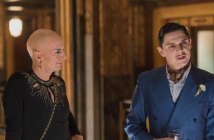Masters of Sex, Season Two, Episode 7, “Asterion”
August 24, 2014, 10:00 p.m. (EST), Showtime
Season two of Masters of Sex cleaved itself neatly into two halves last week, taking most of its subplots to natural conclusion points and hinting at big changes to come. “Asterion” is a structurally innovative episode, tracking over three years in the partnership of Masters and Johnson, as they start their own clinic, continue the study, and fall out of and back into each others’ orbits. The episode is bold, in certain ways, playing almost like an extended version of the sort of montage a Masters and Johnson biopic would have been littered with, though it doesn’t quite nail the accumulated weight of the passage of time the way that, say, True Detective’s “The Secret Fate of All Life” did earlier this year. It feels, for better and worse, like a standard montage—efficient in the way it moves the pieces around the board, but serving more a plot function than a thematic or emotional one.
In certain ways, “Asterion” was necessary at this point in the story. Over the period between 1958 and 1960 covered in this episode, Bill and Virginia are largely estranged. That sort of distance between the series leads, over that length of time, is realistic given how closed off these two are and how reticent they are to be honest about their feelings, but two seasons of this show in which Bill is a huge asshole to Virginia because she tried to keep living a life outside their hotel room like he did would probably wear thin. Bill Masters is an incredibly difficult, punishing, and often cruel man, something this show doesn’t shy away from, and “Asterion” allows us to see just how awful he can be, and for how long, by tracking the evolution of several people’s relationships with him over an extended period in a way that simply wouldn’t have worked if the show had stayed at its standard pace. Masters of Sex needs Bill and Virginia together, but it also needs us to understand the distance they will keep between themselves in order to punish each other or protect themselves.
In a way, the structure of the episode allows us a window into the darker side of Bill and Virginia’s love story that has always been apparent on the show, but only comes into focus when their relationship is viewed from a distance. The way Virginia negotiates her way back into Bill’s life by admitting she has nothing without him, that he controls everything, and then submitting herself to his orders is difficult to watch. There’s a sense that this isn’t just a long game Virginia is playing to flatter Bill’s vanity, but a real sacrifice she is forced to make in order to keep her professional life in order. The show isn’t coy about what Virginia has to do in order to gain and maintain her central role in the study, but it smartly casts its judgmental eye not on her, but on the man who requires all of her subtle degradations: Bill Masters. Bill is better when he is with Virginia, and Virginia is better off when she is with Bill. But those are very different things, and they do not combine to create a match made in Heaven. They combine into a series of compromises each makes in order to have a life they find livable. “Asterion” isn’t a story about happiness, it is a story about various people crawling their way to comfortable.
The episode also watches the Masters’ marriage over the course of this period, as Libby demands and then is granted a second child she hopes will fill the void Bill leaves in her life, and Bill struggles to maintain the veneer of providing for his family even as he has abandoned virtually all other duties expected of a father and husband. This season has not been kind to Libby Masters, but the moment when she tears into Bill about they way he expects the world to cow to his suffering as if no one else is in pain is beautifully done. I doubt this means that the trouble the show is having with Libby is at an end, but this, at least, is a good moment when she feels like a human being the show isn’t actively priming us to root against. She’s just a person again, a woman at sea in her own marriage, looking for an anchor she hopes another child will provide. It’s a moment of humanity that may be too little, too late, but still registers nevertheless.
As the episode ends, at that birthday party for Johnny (whose birthdays, along with Lester’s nascent documentary, help us to keep time as the episode progresses through the years), Libby seems to have come to a sort of understanding with Virginia, inviting her on vacation with the family. Libby Masters has been many things over the course of this season, but one thing she is not is stupid, and this scene let’s us guess that she may know more about the relationship between Bill and Virginia than she lets on.
The relationship that benefits the most from this episode’s time jumps is the one between Bill and Essie. There has really only been one constant beat in this story over the run of the show so far, as Essie tries to make up for past mistakes by being part of Bill’s life and he tries to push her away and refuses to forgive her for her previous inaction. Yet watching that basic pattern repeat over a longer period of time actually makes that moment of semi-reconciliation at the episode’s close land better. Ann Dowd is marvelous in that moment when she tells Bill the lie he needs to hear with tears hovering in her eyes on the verge of exploding out. To get back into Bill’s good graces requires a lie, a compromise that lessens the women in his life in order to allow him to cling to hollow pride and dignity. The women in his life keep paying that price, but for how long will they let Bill act as the sun in his own personal solar system? For how long will Bill’s gravity keep the women around him locked into the orbits he imagines for them? At what point will someone finally refuse to submit?
At one point in the episode, Austin tries to win back his ex-wife, and she tells him that once a bell has been rung, you can’t unring it; you can only listen to it sound. Ultimately, “Asterion” is listening to the sound of the various bells rung in “Blackbird,” watching as the actions of that episode reverberate out over years. Nothing that’s happened can be taken back; no victories can be torn from the jaws of these past defeats. Instead, all that these people can do is go on living and trying to figure out how to be in a world that isn’t fully satisfying to any of them. They compromise. They break themselves down. They submit, they sacrifice, they force themselves forward through a an indifferent world full of uncaring people. They don’t get happiness, here, because that isn’t really what any of them seek. No one here is seeking transcendence or absolution. Everyone is just trying to get to a place where they can be comfortable, even if they have to tell a few lies and lose a little of themselves along the way. The truth can hurt, after all, but the right lie can be the perfect comfort, even if it is a cold, unsatisfying comfort. The world can’t be what we’d like it to be. The people around us are rarely all we hope, but then, neither are we. Sometimes, it takes a lie to get through the night. Sometimes, it takes a lie to get through years.
The Roundup
- “Some men come home to fame and fortune, some to measure ejaculate.”
- “What is he waiting for, a checkered flag?”
- “Trusted to do what? To be good to us? To help us keep a roof over our heads?” “I provide the roof! I have always provided the roof!”
- “Who is it, Bill? Point to one person in this entire world who isn’t suffering. Yet it is only you who insists on spreading the pain around, only you who makes all of us suffer along with you.”
- “My glass appears to be empty.” “There’s a remedy for that.”
- “I think he fears an apology would weaken him. I think he fears…so many things…”
- “I am sorry. I’m sorry for being weak. I’m sorry that I lied.”
- “I can’t take your money. You’re getting nothing out of this. Do you…do you want me to stop?”
- “Lester! Not when we’re talking about money!”
- “Aside from my children, everything I have is permanently, inexorably tied to this work, our work. To you.”
- “You, on the other hand…it’s hard to tell where you end and I begin. You have more of me than you realize, and yet you focus on other men? While you yourself are married?” “Just because one goes home to someone doesn’t mean they are not alone.”
- “I feel…” “Adrift? Without an anchor?”
- “I’ve moved on, Austin. I’m gone.”
- “Don’t feel bad about rejecting me. It’s life. Sometimes the answer is just ‘no.’ In fact, it usually is.”
- “Sometimes exhaustion is the first step forward.”
“Asterion” is a structurally innovative episode, tracking over three years in the partnership of Masters and Johnson, as they start their own clinic, continue the study, and fall out of and back into each others’ orbits.
-
GOOD




